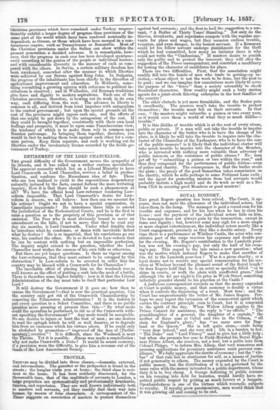TROUBLE.
THIEVES may be divided into three classes,—domestic, external, and intermediate. The garotter or the pickpocket is found in the streets ; the burglar visits you at home ; the third class is resident in the home. It has been suddenly discovered, for the thousandth time, that of the multitude of servants in London, a large proportion are systematically and professionally drunkards, thieves, and reprobates They are well known individually both to masters and servants, yet they readily find their way into houses by means of false characters. A correspondent of the Times suggests an association of masters to protect themselves
against bad servants ; and the first to hail the suggestion is a servant, A Butler of Thirty Years' Standing." Not only do the thieves, drunkards, and reprobates compete with the regular servants for place and wages, but they occasion endless trouble, vexation, and even danger, to the honest servant. If a Rousseau could let his fellow servant undergo punishment for the theft which he had committed, how many an imitator there is who could not write the "Confessions." If masters desire to punish only the guilty and to protect the innocent, they will obey the suggestion of the Times correspondent, and construct a machinery for testing the character of candidates for place. There are two difficulties. First, that the association might readily fall into the hands of men who trade in getting-up societies,—whose object is not the work to be done, but the post to be paid; and we can imagine few associations more likely to serve the purpose of the "fence" than a society ostensibly to check fraudulent characters. How readily might such a body station agents for a joint-stock thieving enterprise in the best families of the country. The other obstacle is yet more formidable, and the Butler puts it excellently. The masters won't take the trouble to protect themselves ; the trouble must fall on their servants. In that case, "the masters might subscribe a guinea or two every year, as it would save them a world of what they so much dislike— trouble."
It is this dislike of trouble which is at the root of every abuse, public or private. If a man will not take the trouble to inquire into the character of the butler who is to have the charge of his plate, is it likely he will take the trouble to inquire into the character of the Chancellor of the Exchequer, who is to have the care of the public moneys? is it likely that the individual elector will take much trouble to inquire into the character of the Member, who is intrusted with nothing more valuable than advocacy of public interests or the resistance of public abuses ? No: men get off by "subscribing a guinea or two within the year," and thus they compound for the performance of public duties—even of police and charity. The consequence is, that the butler steals the plate ; the proxy of the good Samaritan takes commission on the charity, which he sells perhaps to some Petticoat Lane exile ; and the agent for protecting masters from bad servants would probably imitate a high model and do its work as well as a Reform Club in securing good Members or good masters !


























 Previous page
Previous page